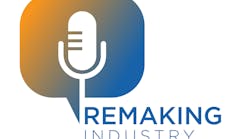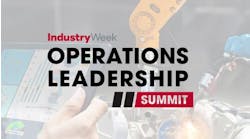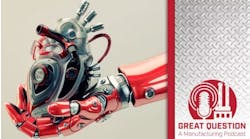In this episode of the Remaking Industry podcast, we chat with Kerrie Jordan, who leads a product-management team at Epicor that recently released a report focusing on trending workforce issues. Click here to listen to the podcast, or read the transcript below.
Chris McNamara: Today, we're looking at workers' engagement of the modern workforce, retention of workers, the modern working environment, worker satisfaction, and all that that entails. Oftentimes, we focus on the digital tools that are central to this thing that we call digital transformation, but the human element is critical, and so that's what we're focusing in on today. This is predicated on a new report from Epicor. We're speaking with Kerrie Jordan, who is Vice President, Product Management, Data Platform with Epicor. Kerrie, tell us a little bit about who you are and what you do, and then let's talk to me about your connection to the report here. It's The Voice of Manufacturing Worker Report, and we touched on perspective from 600 US employees on workplace sentiment, but first, who are you? What do you do?
Kerrie Jordan: I am, as you said, leading a product management team here at Epicor, and at Epicor, we partner with some of the world's most hardworking essential businesses across key industries, manufacturing, distribution, retail, building supply, and automotive. My team of product managers, I have this brilliant team, and we work really closely with these companies to understand the challenges that they're going through and partner with them to help solve those challenges. This kind of report is really critical for us because as part of that partnership, we want to be trusted advisors.
We want to be able to guide the customers and the clients that we work with based on what's really happening out there in the industry, and these kinds of insights really help us when it comes to providing that sort of advice to our customers. When we are building out these kinds of solutions, we really want to understand, what are those business challenges that they're facing? Then, we work with them to help them operate faster, more efficiently, create better, more exciting customer experiences for their customers, a variety of different ways in which we can help these kinds of essential businesses provide more value and continue to grow.
Chris McNamara: Talk to me about The Voice of Manufacturing Worker Report. What jumps out at you? What are some of the two or three key findings in the report?
Kerrie Jordan: Okay, so a bit about this report I think is really unique is that I think a lot of times these sort of surveys speak more to the... or survey the business leader themselves, the presidents, CEOs, CFOs, those leading.
What's different about this one, though, is we spoke directly to the frontline workers, those on the shop floor. Maybe they're in a warehouse or working the retail counter, and that, I think, gave us some really great insight. As you said, over 600 participants. When it comes to some of the key findings, all right, so we asked about morale, state of morale. How are they doing? We found 52% said that their morale at their company was high, 52%, and some of the things that they pointed to as being reasons for that were a flexible schedule, having paid time off, and of course, higher pay.
Then, I think that that really shows, of course, more pay, but also work-life balance is really important to these workers. We also asked about, "What are your biggest challenges that you face on a day-do-day basis?" The number one challenge that they pointed to was the increased cost of raw materials. I think that's interesting because it kind of has implications at really the business level, but frontline workers deal with this in terms of maybe they have shortages that they have to try to solve for. They might have to work with different materials, so they have to figure out a different process. They could be lower cost materials, potentially less quality, so they have to pay, of course, more attention to ensuring quality assurance. Then, just budget cuts, resource constraints.
These kinds of things are stressful to an everyday worker, so I thought that was interesting. Other pieces they called out were supply chain shortages and increased workloads. As you can imagine, if they're dealing with these changes around shortages and around raw materials, different raw materials, that could increase individual workers' workloads and create a challenge for them in their everyday environment.
Chris McNamara: Yeah, it's interesting to think about. When you think what you think about the cost of raw materials and supply chain challenges and the cost of doing business and things like that as particularly C-suite problems, but they do filter down to the workforce that is implementing these tools and techniques and that they might be having to work with subpar materials, and that frustrates them. That makes their life harder or their otherwise strapped because of the larger working conditions. Interesting. I hadn't thought of that. Talk to me. Those are kind of some key findings to jump out of here. What's a big surprise? What most surprised you in the report?
Kerrie Jordan: I think what most surprised me was the appetite for new technology among workers. This is interesting. 60% of respondents said that they would take a 10% pay cut to go work for a company with more modern technology. They'd take a pay cut.
Chris McNamara: Yeah, I'm surprised by that.
Kerrie Jordan: Right, and so I think this is interesting because I think there is a misperception among leaders who are investing in this kind of technology that it'll be disruptive and, therefore, detrimental to the day-to-day, when in reality, there is an appetite. People want to learn new technologies. They want to be a part of an organization that values modern technology. Really, what that does is it empowers people to work faster, work smarter, maybe to deal with those product shortages or rising cost of materials in their day-to-day to maybe more balance the workload. I think it has implications across the board that really should be considered.
Chris McNamara: I was going to ask you why, what's behind that willingness to take a pay cut to be in a more tech driven factory, and you just touched on it a minute ago. It empowers workers, modern technology, oftentimes, particularly when they're younger workforces. They're used to working with these types of technologies in their personal lives. They've grown up with this stuff, and they expect that in their work environment, but that willingness to take a pay cut to be in that environment, that's pretty surprising.
Similarly here, one of the stats in the report is that 80% of respondents say their company is making upskilling a priority. That's a overwhelming percentage there. How is upskilling changing in the digitally transformed industrial workplace? How is it being prioritized? How is it being implemented differently than it was, say, five, 10 years ago or in the pre-digital era?
Kerrie Jordan: Yes. I thought that this was also an interesting stat, 80% saying that their company was investing in upskilling. What we're seeing is companies have acknowledged the need to modernize, and I'm actually really glad to see this focus on people in that transformation. Ways in which we're seeing this happen is through on-site or on-the-job training. Respondents also mentioned online training and even tuition reimbursement were some of the top ways in which companies are starting to upskill. I think it's great that leaders are really focusing in on not just investing in new technologies, but uplifting the team, uplifting their most valuable assets, their people, to be a part of this change.
Chris McNamara: It's interesting. Everyone I speak to across the board, no matter what the topic is, it oftentimes, it usually circles back to the people that are implementing these techniques and these approaches and these tools, you know? The bells and whistles and the shiny new objects are fantastic and the tools are wonderful, but the human element is the critical factor in all these things if they're going to be successful, and particularly getting those humans engaged and properly educated to adopt and implement these tools, that's critical.
Another hot topic that is everywhere is sustainability here. In your report, you note that 61% of respondents would take a pay cut to go work for a more sustainable factory. That's pretty surprising. I wonder how that would compare to five or 10 years ago? Let me get your perspective here. How important is sustainability to the modern workforce? Second question there, does age affect this perspective? That's kind of a leading question because it seems to be that sustainability is a particularly hot topic for younger workforces. Sustainability, how important is it to modern workforce?
Kerrie Jordan: Right, so I wanted to dig into this as well. I thought it was interesting that a pretty serious majority said that they would prefer to work for a company that has a more sustainable factory. I considered this, and I looked back to another question that we had asked, and it was, "Why do you enjoy doing what you do? What provides you the most rewarding or fulfilling experience as part of your everyday?" The first was building something tangible with your hands, building something that lasts. The second piece was contributing to the company's mission, and the third was the people that you work with, going back to the importance of the team, but that second one, being a part of making a difference, being a part of the mission that your company has. This really ties to the sustainability aspect to me.
I think it's bigger than just than just the company itself, being a part of something that's really making a difference to individuals, to families, to communities, and really to customers. I think it's a much bigger topic that now as part of your everyday by working for a company that has a focus on sustainability, you're making a bigger difference in a bigger way. I think that that is part of what's at play here. When it comes to age, we didn't actually ask age directly, but we did ask about tenure, so time in the job, your current job, but also your entire career. 15% were over 15 years in manufacturing, so the rest were less than 15 years. Of course, that would suggest a younger workforce, right? So perhaps this is changing over time.
Chris McNamara: Alongside that awareness and interest in sustainability among younger workers, a trend that I hear reported often also is moving around. The younger workers are less inclined to stay at one place for a long time. Whether that means they're less loyal to an employer, I don't know, but they're more inclined to change jobs or change employers more rapidly. 56% of respondents in your survey said they plan to leave their job within the next year. Now, that's pretty shocking.
Kerrie Jordan: It is.
Chris McNamara: If you're the hiring manager, if you're the owner of a enterprise trying to maintain a workforce that is somewhat trained and 56% plan to leave their job within the next year. What does that mean for industrial employers? What does that mean for the strategies that they implement? Does it make everything harder and more expensive?
Kerrie Jordan: Right? Gosh, I hope not. Okay, so I think there's a lot to learn here, and I was also kind of surprised by that. 56% is a significant number. We also asked, "What would you look for in a new employer?" More paid time off and a more flexible work schedule was... those were the top two that they pointed out. Also, looking for a management team that listens, one that is listening to the employers, making changes based on what the employers would recommend, so, or sorry, what the employees would recommend.
This comes to some guidance that I would pass on based on this, and that's maybe ask employers, or sorry, the employees, "What is it that you know would need in order to have a better work-life balance in your day-to-day? I think that that accomplishes two things, being that management team that listens, so that's the one thing that employees ask for, but then also to make changes in order to potentially be more flexible. Then, how do you be more flexible? Now, that's the piece that I think we need to get into as far as will potentially technology could help solve for that.
Chris McNamara: Yeah, I mean, it's enabling a more flexible industrial workplace than was imaginable five or 10 years ago. Automation is empowering that remote work and all the trends that we've seen over the past couple years that have been prompted by the hardship of the pandemic, so it's interesting to see where that'll shake out. All right. Let me ask you to back up again a little bit here.
Based on consuming this study and this report in whole, let’s talk strategy shifts. I'm going to make you the CEO of an industrial enterprise right now and you're looking at this report. I want you to give me one or two or three strategy shifts that you'd make based on the findings here.
Kerrie Jordan: Yeah, sure. I would make technology a priority. I mean, it's interesting to see just how great of an appetite there really is among the workforce as well as sustainability. That would be a big piece, and we asked, "What kinds of technology are you starting to see your business investing in?" These were interesting, so big data was one, so gathering, normalizing, governing data. Second one was robotics or AI in order to automate the manufacturing process. The way in which we're seeing robotics being used in many ways is to really improve employee health, safety, and well-being by automating those repetitive or potentially dangerous tasks. That could be a potential way to, of course, improve the employee well-being.
Augmented reality was also among the top. I thought this was interesting to see it on the rise, but when you think about it, being able to visualize the manufacturing process to track data, to feed the big data investments, improving quality assurance, and then the last one was 3D printing, to often prototype faster, so making technology and sustainability a priority across the business. A second I would say is, yeah, that flexible work schedule continued to come up, so being able to build flexibility into the business continued to be a resounding thing that the respondents asked for, and then, investing and upskilling.
The only way in which we see organizations being able to move into the future is to have the skill set in order to do so. I thought it was great to see this investment in upskilling, and with 80% saying they see their organization doing it, and they're participating in it. They want to achieve new skills, to be able to continue to advance in their career. I think as an employer, I would review the on-site or on-the-job trainings that I have in place, if I'm making available training platforms for online learning. What kind of tuition reimbursement plans I might have because that is absolutely an important investment in order to make within the people if you're going to take your organization to the next level, if you're going to be moving into the future five, 10 years from now.
Chris McNamara: Yeah, it's interesting. There's cause for optimism on both fronts. The C-suite are offering unprecedented capabilities to work smarter, and then the workforce is empowered to a degree that I don't think we've ever seen before. That's encouraging on both fronts there. In that vein, cause for optimism that you can pull out of the report, give me something that really you find is reason to be optimistic about the near future of manufacturing here.
Kerrie Jordan: I have to say it's continuing to invest and empower the people. Like you said, almost every successful manufacturing leader I've spoken to acknowledges and really points to their people as being the primary reason that they've been successful. If we go forward with investing in automation for automation's sake or any kind of technology for technology's sake, it's going to fall flat, so making sure you're bringing the people along with you, I think, I mean, that definitely gave me a lot of optimism.
We also looked at, "How would you consider your organization? Would you say it's very modern? Would you say it's not so modern?" I thought this was interesting. 48% said that their company is very modern, and then 47% said somewhat modern, and 6% said not at all. That's actually a higher number being on the modern side of things that I would have expected, so I think there is a lot of reason for optimism among our ability as a manufacturing, distribution, essential business industry for the future and what we're going to be able to achieve together.
Chris McNamara: Awesome. I agree. Kerrie Jordan with Epicor, thank you for joining us on The Remaking Industry Podcast today. Very sharp stuff. The report is very interesting. Thanks for sharing your perspective on it.
Kerrie Jordan: Thank you. So glad to be here.
Chris McNamara: And to our listeners, as always, we remind you to go out and make it a smart day.



